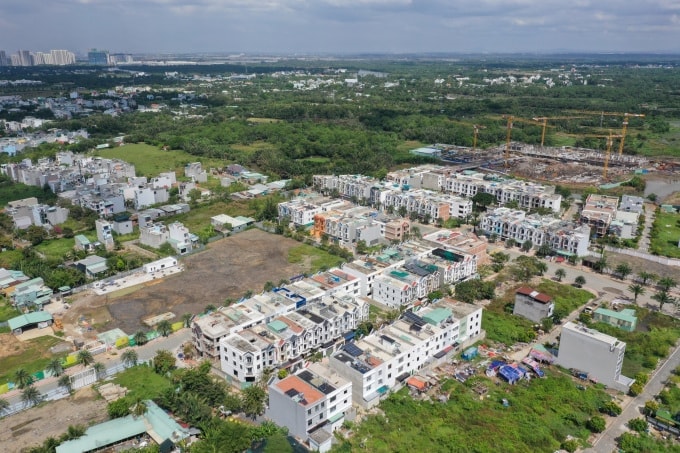A series of social housing projects with thousands of units are planned and built by localities this year.

According to a report from the Ministry of Construction, in 2024, the country will have 108 projects, equivalent to 47,532 completed social housing units. This year, based on data registered by localities, it is expected that the country will have 135 projects, with nearly 101,900 units.
Specifically, Ho Chi Minh City has 21 enterprises registered to build 52,000 social housing units on self-created land funds, along with 8,000 units from 7 land areas calling for investment and 10,000 units from public investment sources. The city aims to reach 70,000 social housing units by 2030 and shorten administrative procedures, creating land funds for the development of this housing segment.
Hanoi plans to have 11 completed social housing projects with nearly 6,000 units, equivalent to 345,000 square meters of floor space. In the next 5 years, the city aims to have 50 new projects registered, with a scale of 57,200 units.
Similarly, many localities have also announced plans to develop housing segments for low-income people, such as Dong Nai, which will start construction of 8,800 new units this year.
Binh Duong also continues to build 26,552 social housing units and has a policy of tax support for businesses developing this type of housing. Dong Thap aims to complete more than 7,000 units by 2030. Meanwhile, Da Nang, Khanh Hoa, Ca Mau, Ben Tre... also plan to develop thousands of social housing units in the next 5 years.
Not stopping at plans, many projects were started right at the beginning of the year. For example, Hanoi started 2 projects, with a total scale of more than 1,500 apartments in Dong Anh district. Hue city is also preparing to build a social housing project in the new urban area of An Van Duong, with a scale of about 1,000 apartments in the first quarter of 2025...
2025 is predicted to be a "boom" year for social housing after a series of promotional policies from the Government. Mr. Truong Anh Tuan, Chairman of Hoang Quan Group, believes that social housing will "brighten in 2025". Many preferential policies have been introduced by the authorities to develop this type of housing.
For example, enterprises developing social housing are exempted from land rent and land use fees, do not have to determine land prices, calculate land use fees or apply for exemption from land use fees and land rent. They also receive incentives on value added tax (VAT), corporate income tax, expanded purchasers and flexible mechanisms in allocating 20% of land funds for social housing. In addition to preferential policies, localities also complete and shorten administrative procedures, and support land funds for investors to build this type of housing.
In this aspect, Dr. Can Van Luc, chief economist of BIDV Bank, said that the social housing segment is being supported by a solid legal corridor. Many barriers to social housing development are being gradually removed, encouraging businesses to have more confidence in participating in this segment.
Currently, the interest rate for loans to buy and hire-purchase this segment is 6.6% per year, higher than the previous 4.8%. However, according to analysts, this is a reasonable interest rate in the context of high inflation and rising commercial housing prices.
In addition, the VND145 trillion credit package of nine banks registered for lending will not be counted towards the credit growth limit, according to the decision of the State Bank. Analysts believe that this regulation will help banks have enough room to support social housing projects, without being constrained by the credit "room" limit.
In fact, social housing is a policy to ensure social security. Recently, the Government has also urged ministries, branches and localities to focus on removing obstacles and promoting the development of this real estate segment.
The Government leader noted that social housing is preferential in terms of loans, land, etc., so its price is more suitable for low-income people and workers. Fast procedures and fast construction also help reduce costs and prices. However, infrastructure for transportation, electricity, water, social infrastructure, health care, education, sanitation, environment, etc. must be fully guaranteed and convenient for people as with commercial housing projects.
TH (according to VnExpress)